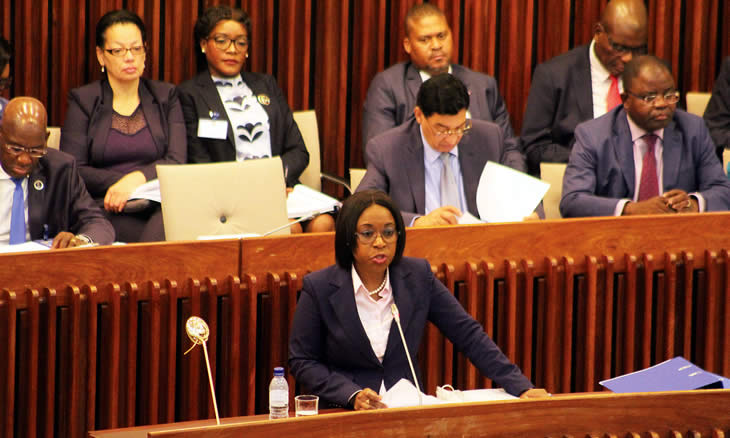Mozambique: ITRANSMAR declares state of alert following boat capsize off Beira
Attorney-General attacks three former ministers – AIM report

Photo: O País
Mozambique’s Attorney-General, Beatriz Buchili, giving her annual report to the Mozambican parliament, the Assembly of the Republic, on Wednesday, strongly denounced the former ministers of labour, finance and transport, respectively Helena Taipo, Manuel Chang and Paulo Zucula, all of whom had held office in the previous government, under President Armando Guebuza.
She did not mention the names of the former ministers, but the details of the cases she mentioned made it very clear who Buchili was talking about.
“One former minister”, she said, “with supervisory powers over a public institute, received, four times in one year, large sums of money from private companies, who had signed contracts to provide services to that institute”.
The Institute in question is the National Social Security Institute (INSS), which falls under the aegis of the Labour Ministry.
“To ensure that the contracts were signed”, said Buchili, “the companies over-invoiced, incorporating the bribes which were later delivered to the former minister by intermediaries”.
In addition to Taipo, who is currently in preventive detention, the INSS case involves eight other suspects, accused of such crimes as corruption, embezzlement and money laundering. Related with this case, 27 vehicles and seven buildings have been seized, and six bank accounts have been frozen.
In a second case, two other former ministers “are accused of having used their positions to receive a bribe from a foreign company, in the context of a contract to build an airport and a coal terminal”.
The company is clearly the Brazilian firm Odebrecht, which built the country’s most modern airport, in the northern city of Nacala, inaugurated in 2014. The airport is hardly ever used, and the only scheduled flights are to Maputo, operated by Mozambique Airlines (LAM).
But perhaps this airport was only built because of a bribe. Odebrecht operated an international network of corruption, paying bribes in at least a dozen countries to secure contracts. Charged in a New York court, together with the Brazilian petro-chemical company Braskem, Odebrecht pleaded guilty. The two companies settled the case by agreeing to pay a combined fine of 3.5 billion US dollars.
The court case showed that Odebrecht had paid bribes of 900,000 dollars in Mozambique. Later investigations indicated that the money went to Zucula and Chang.
“One of the ministers omitted his legal duty of diligence”, said Buchili, “and created difficulties for the company at the start of the building work”. Faced with this situation, Odebrecht offered money “which was deposited in banks abroad, via offshore companies”.
Contractual terms favouring Odbrecht were approved, and more money was paid also through offshore companies and foreign banks.
The second minister (clearly Chang) issued state guarantees under the same contract, and once again bribes were channelled to foreign banks.
Buchili used the cases of the former ministers to show that her office does not shirk from charging high ranking individuals with corruption.
She admitted that the public perception is that only people guilty of “petty corruption” are ever punished, while those guilty of “grand corruption” escape justice.
“But for the public prosecutor, there is neither petty nor grand corruption”, Buchili said, “because any act of corruption has negative effects on society, hence in our action we are governed by the principle of equality before the law”.
Everybody had a role to play in fighting corruption, she insisted, but “certain public institutions (whom she did not name) do not share this belief, and think it is only the job of the public prosecutor’s office. So they don’t participate.
She also criticised those independent auditors who, when hired by state bodies, “omit their duty of informing the public prosecutor of facts that may indicate crimes of corruption”.












Leave a Reply
Be the First to Comment!
You must be logged in to post a comment.
You must be logged in to post a comment.